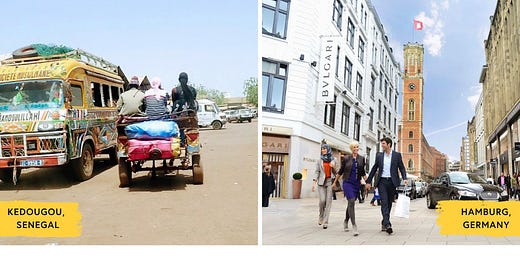There is one question that has defined my life:
Why is Africa poor?
The first time I asked this question, I was seven years old.
Growing up in Africa in the 1980s, most of us were poor. A few people maybe had a car or a truck. But if they did, it was almost certainly rickety and unreliable. Most of us still used horse carts. The only person I ever heard of driving a Mercedes was the president of the country (and NGO staff).
But when I moved to Germany as a child, it felt that almost everyone had a nice car and house. The stores were filled with piles of fine goods, and people were busily buying them. Even the taxi drivers drove Mercedes cars!
Even as a little girl, the question seemed obvious and insistent:
Why did Europeans have so much, while the people in Senegal still had dirt streets and almost no grocery stores, just a bunch of traditional markets?
Over the years, I’ve heard a number of answers. Some—like the ideas that Africans have low IQs or that we’re lazy—stem from racial prejudice. Other explanations, more popular among Africans and their allies, focus on the ways Africa has been exploited.
For the most part, this latter group tends to blame the following factors:
Corruption and bad leadership
Colonization
Stolen natural resources
While all three have had negative impacts on Africa, they aren’t the root cause of Africa’s poverty today.
What is?
Bad business laws.
And to be more specific, WAY too many of them. Let me explain.
Why Corruption Isn’t The Source of African Poverty
Corruption exists everywhere, from Senegal to Chicago to Singapore. It’s just a fact that there will always be people who try to take advantage of the system.
The key to cutting down on corruption isn’t to change human nature. It’s to change the incentives - specifically, the economic and legal barriers - that make corruption a person’s easiest option.
In other words, Africa isn’t poor because of corruption. Africa is poor because of the tangle of senseless laws that entrepreneurs face daily, and corruption is merely a symptom of that mess.
For example, African entrepreneurs pay nearly 10X more than American entrepreneurs on taxes for imported goods. In Senegal, I pay 45% in tariffs on some of my raw materials. In America, I pay just 4%.
At first blush, that might seem like a great way for the state to earn revenue. But what people forget is that entrepreneurs in other countries can afford basic business supplies such as cardboard boxes and other packaging, computers, printers, etc. Africans cannot.
The net impact is that it becomes nearly impossible to create a globally competitive business selling value-added goods in Africa. Believe it or not, even with much lower labor costs in Africa, it’s cheaper for me to produce goods in the US than in Africa.
So, where does corruption come in? Well, when you have to pay a ridiculous 45 PERCENT tariff on your imports, it becomes faster and cheaper to pay a bribe than to adhere to the law. And this is not an isolated anecdote. It’s a systemic problem.
As Hernando De Soto said about entrepreneurs in third-world countries:
"[They] do not so much break the law as the law breaks them."
The system we face is riddled with a web of senseless and oppressive regulations, making it incredibly challenging to conduct business in an honest and transparent manner. This excessive burden pushes entrepreneurs towards unethical practices, such as paying bribes, just to navigate through the hurdles created by these bad laws.
Corruption is a symptom of bad laws that keep us poor. If the obstacles were less severe, fewer businesses would need to pay bribes to get things done.
That’s why it’s so important to dismantle these nonsense laws and allow African entrepreneurs to build legal businesses and kickstart economic growth.
Why Colonization Isn’t the Source of African Poverty
I always get a lot of pushback when I say that colonization isn’t the reason that Africa is poor. So let me lay my cards on the table:
Was colonization horrible? Yes.
Were people treated badly? Yes.
Were resources plundered? Yes.
And were Africans turned into the global poster child for poverty porn and pity, reducing our dignity in the eyes of people around the world? Yes.
Africa suffered the largest and most violent slave trade in human history, which is probably why it’s had such a massive imprint in our collective psyches.
But colonization still is not an excuse for our poverty today.
When we place blame outside ourselves and focus on how victimized we Africans have been, we continue to give away our power. We will never forget our past, but at the end of the day, we’re responsible for leading our own people to a brighter future.
It’s time to take back the narrative and make it OURS. Africa's prosperity is within our reach, and we hold the key. To quote my late, great mentor Dr. George Ayittey:
“African problems must be solved by Africans.”
Today, we are held back not by the colonial leaders of the past, but by our very own governments and bad commercial laws. Africa is poor because generations of leaders, policies, and regulations have made it difficult for Africans to prosper.
Consider: If you're an aspiring entrepreneur, the time it takes to register an LLC in certain African countries could be up to 50,000 times longer than in the United States.
Given this staggering bureaucracy, what motivates any entrepreneur to embark on their business journey here? And why would any rational investor entrust their capital to a system that penalizes business owners?
Our solutions won’t come from external sources; they must come from within. And the best place to start is by making it easier for Africans to start businesses, create jobs, and build wealth.
Why Stolen Resources Aren’t The Source of African Poverty
I can’t tell you how many times I’ve heard Africans moan, “If only we controlled our natural resources…”
It’s as if they think that having control over cobalt, diamonds, oil, chromium, platinum, or uranium would magically solve African poverty.
In my eyes, they have the equation backward. We have to solve the problem of poverty first. As long as we remain poor, we (and our natural resources) will be taken advantage of by other nations—in collaboration with our unscrupulous “leaders” and their cronies, of course.
Creating greater economic freedom for on-the-ground wealth creators, a.k.a., entrepreneurs, is the liberating step that will change the status quo.
What I’m about to say may surprise you, but on the whole, natural resources have been more of a curse than a blessing for most African nations. When they recently discovered oil in my beloved country of Senegal, I wept, because I knew that:
We would not see much of it.
We would suffer from all the setbacks caused by greed (both internally and externally).
And I was right. It looks like we’ll only get 10% of the proceeds on the oil side, and we’re already seeing disruption.
Natural resources are an asset, but they are not essential to building a prosperous nation. Hong Kong, Singapore, Mauritius—they have all created thriving economies without having many natural resources.
Everyday Africans won’t benefit from oil. They will benefit from JOBS.
Bottom line: Africa is poor because there are no jobs. And there are no jobs because we have some of the most challenging business environments in the world.
When we get our business environments in order, prosperity will follow.
"Why don’t we have enough jobs in Senegal? Why are our young people crossing the Atlantic in tiny fishing boats in an attempt to get to Europe, with dreams of a better life?
Because it is like swimming through molasses to start a manufacturing business in Senegal—the kind of manufacturing business that creates jobs.”
—Magatte Wade, The Heart of a Cheetah
Only 3 weeks until the release of my upcoming book The Heart of a Cheetah. More details coming soon, but in the meantime, you can sign up for updates here!
A huge THANK YOU to everyone who’s expressed support.






This is so insightful and inspiring! I totally agree with you ❤️❤️
Great text, lots of valuable informations!